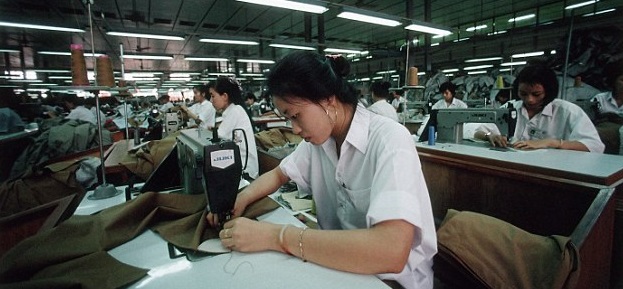JAMES ROYCE WRITES — A bad day of surfing might be better than a good day of working, but Australian surf wear brand Rip Curl is experiencing neither of these pleasures after admitting to using factories in North Korea, where work conditions are reminiscent of slave labor, to create the company’s 2015 winter apparel line.
According to the Sydney Morning Herald, workers at a Taedonggang clothing factory near Pyongyang, North Korea’s capital, were photographed in July 2015 making the iconic company’s garments, later shipping the clothes to retail outlets around the world with a “Made in China” label.
North Korea exploits many workers, including university students and school children, in its factories, such as the one in Taedonggang, forcing them to work for more than 20 hours a day and minimal pay, if any at all.
“The harsh reality faced by North Korean workers and students is unpaid labor and exploitation,” deputy Asia director at Human Rights Watch Phil Robertson said. “Those who refuse face being sent to forced labor camps where they must do hard labor, face physical abuse from guards and are treated less than human.”
Rip Curl chief financial officer Tony Roberts was quick to blame contractors for the practice, claiming they might have diverted production orders to unauthorized factories unknowing to the company. Roberts stressed that the Australian retail company does not “approve or authorize any production of Rip Curl products out of North Korea.”
Rip Curl’s critics still aren’t buying it.
One critic, Dr. Helen Szoke, chief executive of Oxfam Australia, a charity focused on fighting poverty, voiced her skepticism and on-going disdain for Rip Curl’s unethical business practice, saying:
“Australians would be shocked to hear that an iconic Australian brand with roots on the surf coast of Victoria can’t confidently track clothing produced within its own supply chain. Rip Curl has no excuse for being unaware of what is happening. Companies are responsible for human rights abuses within their business — not only morale but also within international human rights frameworks.”
Australia sources an estimated 90% of clothing items in the garment retail industry from Asia despite a huge portion of Asian garment workers being paid minimal, or “poverty,” wages.
It is hard to say if Rip Curl’s constant back-paddling will save them from public criticism. One thing is for sure though, if an entire line of clothing can be made and shipped around the world without the company itself having any idea, then there is a deep-seated problem in one of the world’s most popular, as well as Australia’s most iconic, surf brands.

